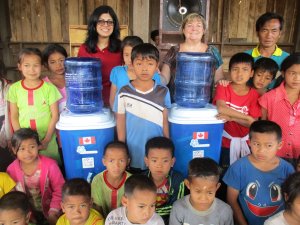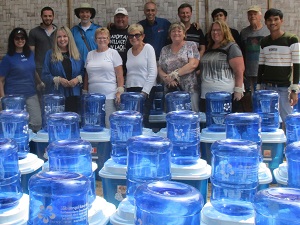Residential consumers of water in Canada use over 340 litres per person per day. That’s roughly twice as much per person as in other industrialized countries, other than the United States and Australia. Those of us fortunate to be living in this country of ours, and this province, may take our supply of fresh water for granted, and the sanitation facilities which come with our high standard of living. In other, less fortunate places on Earth, water may be delivered to communities through expensive processes such as desalination or complex recycling. Water is a vital, and can be a scarce, resource.
Access to safe drinking water is an essential requirement for maintaining public health. People, especially children, lead healthier and more successful lives when they have access to clean water, sanitation, and hygiene. Children in poor health, when deprived of that access, miss education and deprive their entire families of healthier lifestyles. Women and girls are often deprived and put at risk because they are constantly required to travel great distances to bring potable water back to their communities.
 |  |
Rotary members around the world share the view that clean water and sanitation is a human right. That’s why it is one of Rotary’s six areas of focus. Thanks to Rotary, 23 million people now have safe water and 21 million people have access to sanitation and hygiene. The aim is to extend that right to people worldwide by 2030.

One local example of this work is Ladner Rotary’s contribution to the Adopt-A-Village program in the impoverished Southeast Asian nation of Laos, which is still struggling to recover from the Vietnam War. The original purpose of the program was to increase education of children in remote villages. Because the children, in the schools built and with the supplies provided, often could not attend classes because of illness from unpotable water, the program branched out to deliver water filters to each village household.
 |  |
Rotary also supports programs that enhance communities’ awareness of the benefits of safe water, sanitation, and hygiene. When children learn about disease transmission and practice good hygiene, they not only miss school less, they take those lessons home to their families, multiplying the impact of efforts. Better health leads to better education, and education to better health.